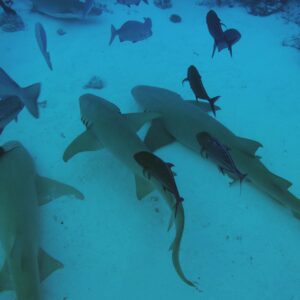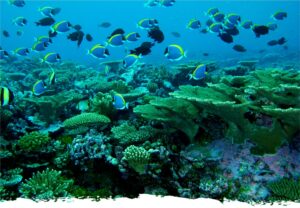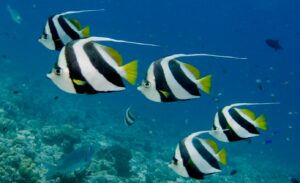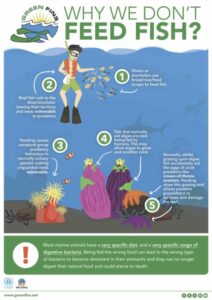5 REASONS NOT TO FEED MARINE LIFE

Whether you are SCUBA diving, snorkeling, or standing at the shoreline it may be tempting to feed the marine life that you see. However, feeding marine life poses a number of problems for both them, for us and aso for the environment.
In order to enjoy marine life encounters responsibly and keep marine life, yourself and others safe, it is important not to feed any type of marine life.
In recent days there has been coverage in regard to shark feeding incidents which resulted in the Ministry of Tourism issuing a circular to all tourism establishments and stakeholders. This highlights that all ‘tourist related activities should be conducted in harmony with the environment and bio-diversity’ of the Maldives.
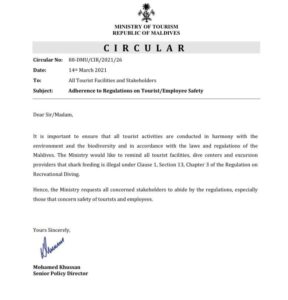
Ensuring local laws and regulations are followed in any destination in the world is vitally important. But do you know why you should not feed any marine life?
We take a look at the key 5 reasons below.
IT CHANGES NATURAL BEHAVIOR
Feeding sharks, rays or other marine life by hand promotes a behavior called ‘conditioning’. This is where the marine life begins to associate us humans with food. Instead of being naturally cautious around people, they begin to see humans as an easy food source. The natural diet of marine life can be quite complicated and is not like our human meal cycle of breakfast, lunch and dinner! They may only feed once a day or even seasonally or when natural food sources are available. When any marine life starts to anticipate when they will be fed, not only does it interfere with their natural feeding ability, it also means they are more vulnerable to predators and decreases their willingness to search for food on their own. This in turn may lead to a change in migration patterns.
IT LEADS TO POOR HEALTH
Just like us humans, all marine life needs the right type of food in their diet. Amino acids found in their natural diet play a very important part in their well being. Without realizing some of food products may be contaminated, old or spoiled. Even feeding bread or biscuit crumbs from your picnic lunch is not good for marine life. Feeding any inappropriate food, non-food items, or contaminated food jeopardizes their health. Initially, the most resilient marine life may survive however, others may die or over time fall ill and attacked by predators.
IT UPSETS THE BALANCE OF THE MARINE HABITAT
The underwater marine life community depends on many things to co-exist effectively and maintain natures balance. Everything under the waves; from coral to crabs, fish to sharks all have different requirements when it comes to habitat and food source. Introducing an unnatural meal or feeding at a time of the day that is not their natural routine disturbs these relationships and could ultimately lead to the decline of certain species and the over-population of others.
IT DAMAGES THE OCEAN ENVIRONMENT
By feeding marine life you are unnaturally adding food to the ocean which when done so around coral reefs increases the nutrient levels in the water. This in turn increases the growth of algae that damages corals. Corals are already fighting against coral bleaching, warmer ocean temperatures and the impact of reclamation and development, without further stress being added.
The majority of reef fish are ‘grazers’, meaning they only eat algae. They are responsible for keeping the growth of the algae on coral reefs under control so that the reefs are not smothered. By feeding marine life in general, even if you are feeding a shark, the remnants of the food product will be seen as an easy tasty morsel and eaten by fish life. This in turn alters their behavior. Potentially they will no longer snack on the algae that needs to be removed and with nothing else to prevent it the algae will grow and grow and over time the coral reef will be destroyed and the habitat of many species lost.
IT CREATES AN UNSAFE ENVIRONMENT
In areas where marine life are fed regularly there are often feeding frenzies and marine life and the people present may get injured. Remember marine life can not distinguish fingers and limbs from the food that it is being fed. It also causes marine life to become familiar and feel safe around boats. This in turn increases the risk of injury from boat propellers, entanglement in fishing line or harm by people who are anxious or frightened of their behavioral changes.
HOW CAN YOU BE A RESPONSIBLE TOURIST?
- Follow PADI and Green Fin guidelines when you are on a dive or snorkeling trip.
- Do not feed marine life or throw any food scraps in to the ocean. Put them in a bin instead.
- If you see someone feeding marine life, please ask them to stop doing it and if you can, explain to them why.
- Report businesses or companies who do not comply with regulations to the Ministry of Tourism or EPA.
- Share this information with others.
Want to find out more about how to be a responsible tourist when you next visit the Maldives?
Sign up for our newsletter here.
